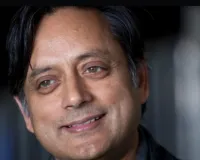Shashi Tharoor: A Diplomatic Asset or Congress's Unyielding Maverick?
Shashi Tharoor, the eloquent Congress MP from Thiruvananthapuram, continues to be a complex figure within the Indian National Congress.

Shashi Tharoor, the eloquent Congress MP from Thiruvananthapuram, continues to be a complex figure within the Indian National Congress. Revered for his global stature as a former UN diplomat and his consistent electoral triumphs, Tharoor often finds himself at odds with the party's leadership, highlighting the tensions between his individual prominence and the party's collective ethos.
A Diplomatic Role Sparks Controversy
Tharoor's role in India's diplomatic response to the May 2025 India-Pakistan conflict brought these tensions to the forefront. In a strategic move, Prime Minister Narendra Modi's government chose Tharoor to lead an all-party delegation to the UK and four other major global capitals to present India's stance on cross-border terrorism. This decision bypassed Congress’s nominations, triggering discontent within the party.
Congress had proposed a list of four leaders—Anand Sharma, Gaurav Gogoi, Syed Naseer Hussain, and Amrinder Singh Raja Warring. However, only Sharma was included in one of the delegations, while the others were sidelined. The government’s choice of Tharoor, while leveraging his diplomatic expertise, sparked dissent within Congress and raised questions about internal unity.
Internal Discontent and Public Criticism
The decision exposed deeper fault lines within Congress. Jairam Ramesh, a senior Congress leader, indirectly criticized Tharoor by stating, "Congress mein hona aur Congress ka hona mein zameen-aasmaan ka antar hai" (There is a vast difference between being in the Congress and of the Congress). This comment was seen as a veiled jab at Tharoor’s perceived alignment with the government’s narrative on national issues, particularly on foreign policy and security.
Tharoor's predicament reflects broader challenges within the party: a lack of internal democracy, the Gandhi family’s unchallenged authority, Mallikarjun Kharge’s struggles as party president, and the Congress’s inconsistent stance on national issues that intersect with partisan goals.
Tharoor’s "mistake," however, is not betrayal but his commitment to nuance over polarization. In an era where party politics often demands rigid opposition, Tharoor has chosen to prioritize national interest and policy pragmatism. His support for progressive initiatives of the Modi government—whether lauding India’s G20 presidency, endorsing cultural diplomacy, or appreciating infrastructure projects—has been seen as dissent within his own party.
This independent approach has come at a significant cost. Once regarded as a statesman within Congress, Tharoor now finds himself increasingly marginalized. His bid for the Congress presidency garnered public enthusiasm but faced resistance from party loyalists wary of his deviation from the party’s anti-government stance. He is now often overlooked for leadership roles and denied major responsibilities, as the party struggles to reconcile his diplomatic brilliance with its rigid ideological framework.
Tharoor’s journey encapsulates Congress’s broader dilemma: how to integrate dynamic, independent voices without undermining party unity. His case underscores the need for a more open, democratic culture within Congress, capable of embracing diverse perspectives while maintaining cohesion.
As Congress grapples with its identity in a rapidly evolving political landscape, Tharoor’s paradoxical position—bolstering the party’s global image while challenging its internal orthodoxy—remains a potent symbol of both its potential and its challenges.


.png)









